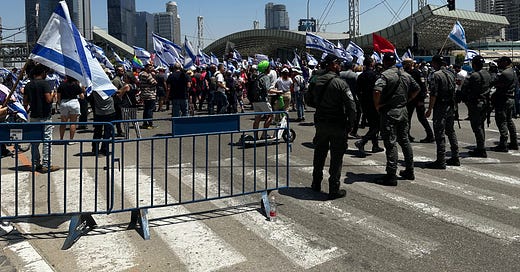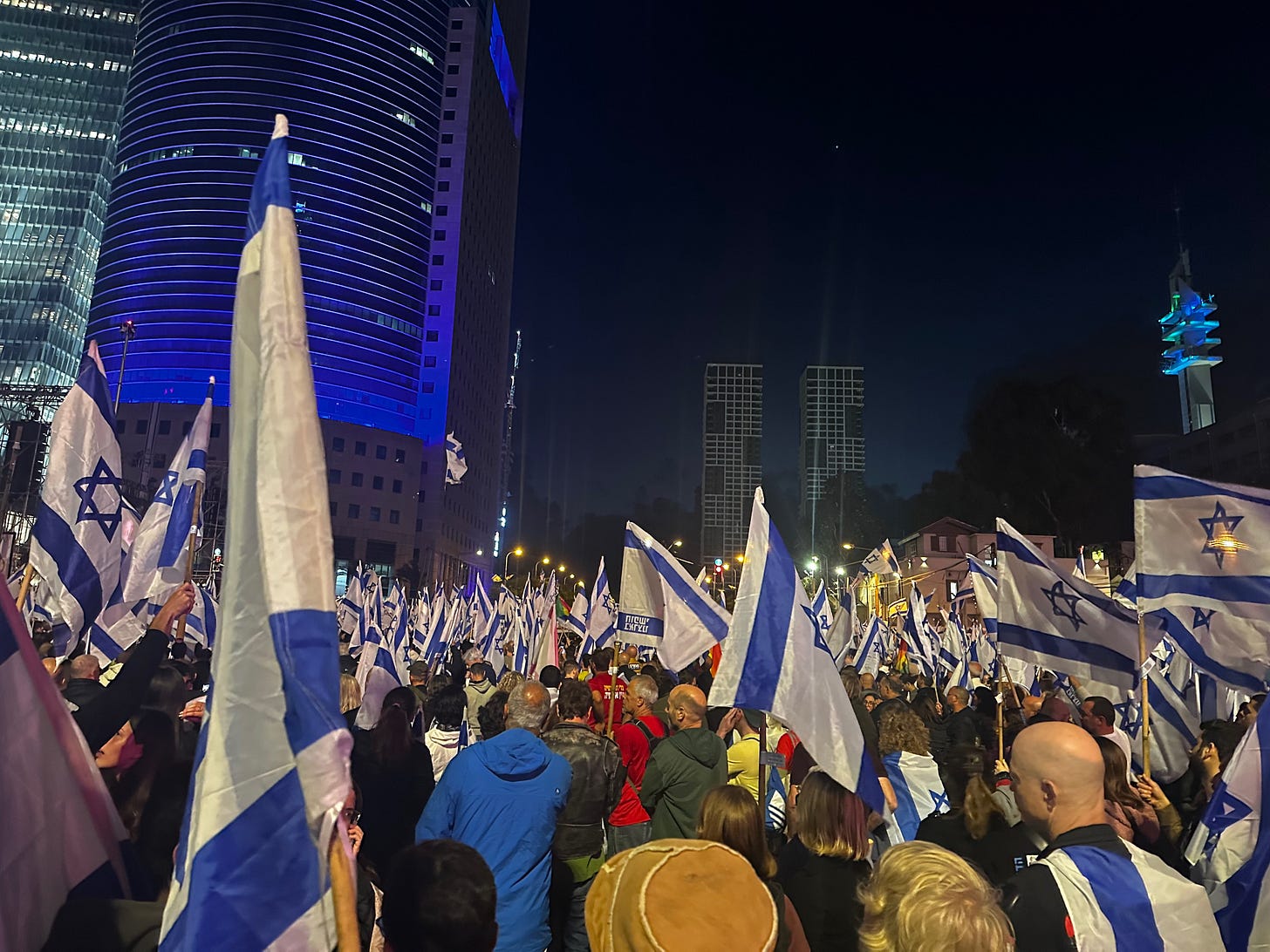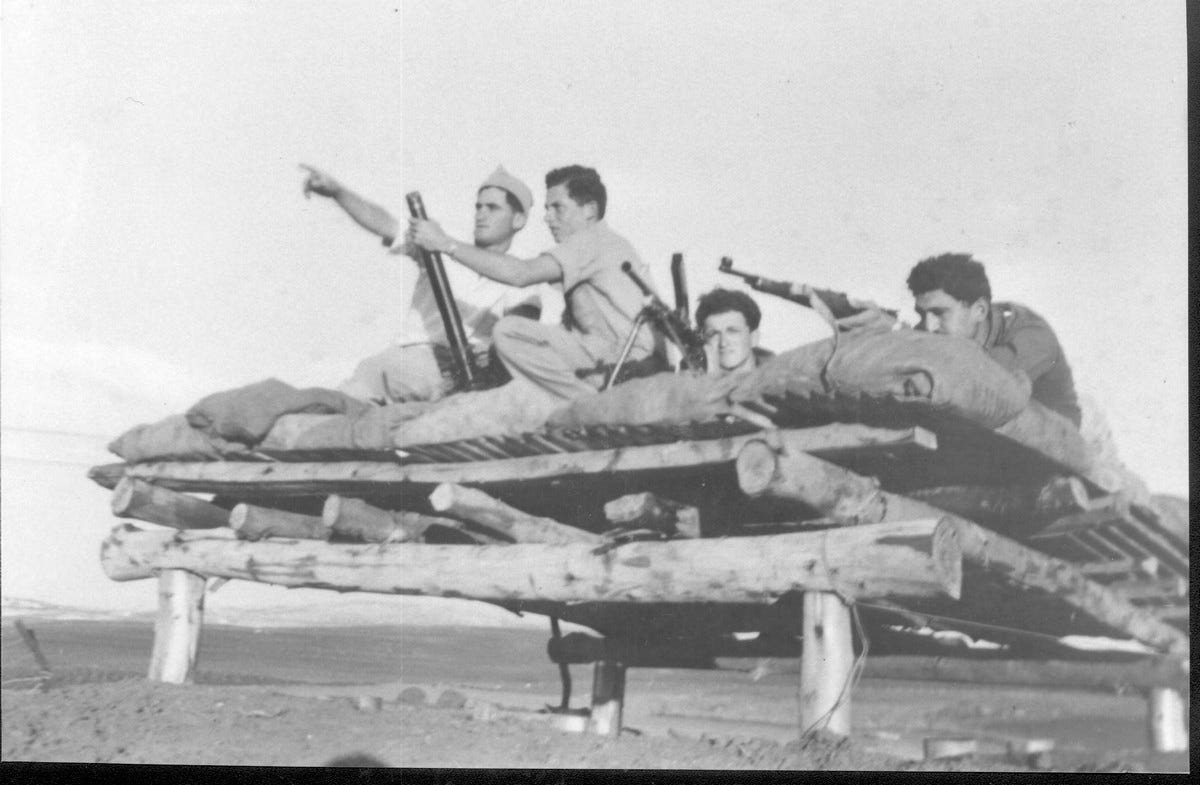Tel Aviv Diary May 5, 2023
Missiles from Gaza, Terrorist Found and Killed,Protest Continue,Coaltion Crisis, Business and a Restaurant Review
DEFENSE
This week, Israel and Gaza exchanged another round of missile fire, followed by Israeli attacks on the strip. This latest round all began when a Palestinian security prisoner died, as a result of his extended hunger strike. The prisoner was a member of the Islamic Jihad, which retaliated by firing a number of rockets into the area around Gaza. Israel then responded with tank fire on positions near the Gaza border. The Palestinians then launched 106 rockets aimed at targets inside Israel surrounding the Gaza Strip, including Sderot. Not all of the rockets were intercepted, due to a technical malfunction in one of the Iron Dome batteries. Six foreign workers were injured by one of the rockets.
The first attack took place as parents were picking up their children from school. The government discussed a response, but ultimately decided to bomb a number of unoccupied Hamas installations in Gaza. The reality is that the government did not want an extended altercation; thus, Israel made an extra effort to ensure that no one was killed as a result of its bombing. News commentators poked fun at the fact that the Air Force was “so ineffective that it could not even kill one Palestinian”, but of course, that was the point.
COALITION CRISIS: BEN-GVIR
The person who was least happy with the government’s chosen response to the rocket fire from Gaza was MK Itamar Ben-Gvir. As current polls show support for Otzma Yehudit waning, Ben-Gvir announced that his party would not participate in Knesset votes. Prime Minister Netanyahu responded by stating that Ben-Gvir’s party was free to quit the government. Ben Gvir's replied that if Netanyahu did not want him in the government, he should fire him. This political tension may not result in a crisis, but the events of the past week underline how few of the election promises Ben-Gvir made can be carried out. Netanyahu believed that once Ben-Gvir was part of the government, he would act responsibly. Of course, Netanyahu was wrong.
COALITION CRISIS: THE ULTRA-ORTHODOX
The other coalition crisis Netanyahu faces is with the ultra-Orthodox. Their coalition agreement called for passage of a law that would permanently exempt ultra-Orthodox young men from army service, prior to the vote on the next budget. In light of the ongoing protest movement, Netanyahu is very wary of bringing such a bill to the floor. The pressure on some members of his own Likud faction to vote against such an exemption bill will be significant. Another part of the coalition agreement calls for a massive increase in funding for the ultra-Orthodox school system, something that seems impossible for the Treasury to do, during a period of shrinking tax income, due to the high-tech and housing slumps occurring simultaneously. In an interview earlier this week, the head of one of the ultra-Orthodox parties, stated, “What is the point of making an agreement with Netanyahu if he never keeps his agreements?” There are a long line of politicians who have learned that lesson the hard way.
In the meantime, the government has less than one month to pass a budget (or the current government will automatically fall). With such dismal poll numbers for members of the coalition, it would be a shock if they do not find a way for the budget to be approved. Of course, in Israeli politics, anything is possible.
SYRIA AND IRAN
The Israeli Air Force attacked targets in Syria twice this week—at least according to foreign sources. During this past week, the Iranian President visited Syria. On Thursday, during meetings in Greece, Defense Minister Galant stated that Iran now has enough fissionable material for five bombs. Now what?
FIGHTING TERROR
In a major achievement, the IDF, together with Security Services, located the terrorists who killed three members of the Dee family — a mother and two daughters — one month ago. The suspects were hiding in the Kasbah of Nablus, and this morning, a special unit infiltrated the area, posing as Palestinians. When the terrorists were located, the unit attempted to flush them out of the building they were in. After a brief firefight, the terrorists and the person helping them were killed. The Israeli commando’s dog, named Jango, had assisted on numerous previous missions, was shot and killed by a terrorist.
Despite the success neutralizing the terrorists, there is no expectation that this operation will put an end to the recent wave of attacks, including both stabbing attacks and vehicular assaults. During the past week, none of the attacks resulted in any deaths, although the attacks occurred almost daily.
Violence in the Arab Israeli communities continues to present significant problems. On Wednesday, four Israeli Arabs were killed, in four separate incidents.
PROTEST MOVEMENT
The protest movement continued its weekly demonstrations. This past Saturday night, one of the largest crowds showed up, partially in response to the right-wing protest in Jerusalem on the previous Thursday night. It was estimated that 300,000 people came out to protest throughout the country this week
.
On Sunday, the Likud planned a demonstration in front of the home of Aharon Barak, the 86-year-old former Chief Justice of the Supreme Court. Barak lives down the block from me. Supporters of the proposed Judicial reform plan have somehow turned Barak into the bogeyman of the judicial system, proclaiming that all they want to do is correct all the terrible things that Barak instituted. In an interview, former Likud Justice Minister Dan Meridor attempted to set the record straight, stating that it was the Likud who pushed for a Basic Law on the Rights of the Individual, while he was Justice Minister. They knew at the time that such a new Basic Law would give the Supreme Court additional power to intervene in some government decisions, nevertheless, they were fine with that. Barak was the chief justice at the time. The Likud had only been in power for less than 15 years, and they still thought it was essential to have checks on government power— unlike some parts of the Likud of today, which is interested in the exact opposite. A much larger number of supporters of Barak showed up on Sunday night near his home to support him
.
Thursday was another day of national disruption, with the focus of the protest on “sharing the burden” i.e., a rejection of attempts to permanently exempt the ultra-Orthodox from military service. Roads were closed, and demonstrations stretched from late morning, late into the night.
Part of the group of reservists protesting the proposed Judicial reform have focused on the issue of ultra-Orthodox draft, and have been manning a tent outside the main IDF recruitment office for the center of the country — the place where the Yeshiva students are required to go to receive their military service exemption. The reservists do not expect to change any minds, but hope to at least plant seeds of thought in those avoiding service. They report numerous interesting conversations, with many of the Yeshiva students saying that they would actually be open to serving, but the young men knew if they did serve, their possibility of getting a good match would be severely hurt.
Crime
Crime, especially murder, has been soaring especially among Israeli Arabs. Since the beginning of May alone14 Israeli Arabs have been murdered since the start of 2023.
LIGHT RAIL
The opening of the Tel Aviv Light Rail’s first line has been delayed, once again. The most recent expected opening date was this past week, but ongoing problems in the train’s breaking system have delayed the opening to some unknown future date. It is already years overdue and billions over budget
.
A PIECE OF HISTORY — Civil War in Palestine: Part I
The United Nations' vote to approve the Partition Plan was met with rejoicing in Jewish Palestine. A dream had been nearly achieved. Golda Meir, a future Prime Minister, spoke to the crowds in front of the Jewish Agency building in Jerusalem, stating:
“For two thousand years, we have waited for our deliverance. Now that it is here, it is so great and wonderful that it surpasses human words. Jews, Mazal Tov!”
However, many understood that the greatest challenge lay ahead. David Shatiel, the commander of the Haganah, understood this well. He wrote in his diary on the night of the 29th, after the Partition Plan vote, “None of us knows what might happen tomorrow.”
The next day, a Jaffa-based band attacked a bus carrying Jewish passengers. On December 5th, the British cabinet announced they would withdraw all their troops from the country by May 15th, and that, in the interim, they would remain neutral in the fight between Jews and Arabs. By and large, they adhered to this policy, although both sides complained about British actions. During December, many mixed areas saw population exchanges, and demarcation lines became clear. It is estimated that during this period, 100,000 Arabs either left the country or moved from mixed towns to their ancestral villages.
In early January 1948, members of the Arab Liberation Army, which primarily consisted of Palestinians trained by surrounding Arab states, entered the country without British interference. On January 10, they attacked the settlement of Kfar Szold, but were repulsed. Jewish settlements throughout the country were isolated, and major efforts had to be expended to resupply them. Even Jerusalem could only be resupplied at great cost. One of the most famous and tragic situations involved the effort to send reinforcements to the settlements of Kfar Etzion near Jerusalem, which had been cut off from Jewish forces. A platoon of 35 soldiers was sent on foot to reinforce the Etzion settlements. The Jewish force was discovered en route and ambushed; all 35 soldiers were killed. This force became known as the “Lamed Hay” (35 in Gematria).
By March, the tide of battle seemed to be turning against the Jews. The road to Jerusalem had become impassable. Over the course of this period, Jewish forces primarily maintained a defensive posture, only undertaking offensive operations on a local basis. As a result of these military setbacks, the United States began to waver in its support of the UN’s Partition Plan. Seemingly acting without President Truman's approval, the US Ambassador to the United Nations, called for a delay in the Partition Plan, and instead proposed placing Palestine under UN trusteeship.
BUSINESS
Healthy IO closed a finance round of $50 million. However, at the same time, the company laid off 75 workers. It took six months to close the round, and has been predicated on becoming profitable over the next two years, and thus the cutbacks. The story of Healthy IO is the story of much of Israel start-up world. Since the beginning of the attempt to overhaul the Judicial system, 80% of the new Israeli startups have registered outside of Israel. This is the exact opposite of the percentages before the Judicial overhaul plan was announced.
Corning Glass is closing its Israeli R&D facility.
A TASTE OF TEL AVIV— Cafe BA’kerem
RESTAURANT REVIEW, By Tali Schulman
Continuing in the Shuk HaCarmel neighborhood, today we visit Cafe Ba’Kerem. A small coffee shop, located right on the outskirts of the shuk, on Rambam street. Cafe Ba’Kerem is a cute little spot serving both as a coffee shop, as well as a wine bar. Come in the morning for quality coffee and some of their incredible pastries. I highly recommend their savory pastries in particular. My favorite comes with mushrooms and lots of cheese in a croissant dough base. Alternatively, drop by in the evening for some small bites and a bottle from their fabulous wine selection. Either way, you’ll be sure to enjoy the cute space and shuk vibes regardless of the time of day.
For more Tel Aviv restaurant recommendations, you can find me on Instagram @talischulman where I save all my food adventures in my highlights!









